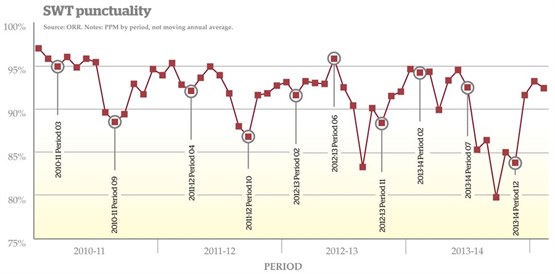Shoveller paints a picture of years of neglect. Perhaps not deliberate neglect, but neglect all the same. And fixing this backlog is neither easy nor quick, as Railtrack, the Strategic Rail Authority and Network Rail all subsequently discovered with the West Coast Main Line over a decade ago.
Waterloo does not have easy alternatives, as the WCML had, with trains able to divert into St Pancras instead of Euston or take different routes into Manchester. The South Western terminus might be able to take First Great Western’s HSTs diverted from Paddington, to allow Reading to be rebuilt, but we’re not going to see third-rail Class 444 Desiros resting on the blocks in Brunel’s trainshed.
Track renewals
In any discussion about the Alliance, it doesn’t take long before the subject of Waterloo starts to dominate.
It’s already been the subject of an aborted attempt to improve capacity by making Platforms 1-4 longer. And the cancellation of this project came with a sting in its tail, because it had also been planned to renew ageing track in the platforms. This was not done, but because Shoveller sits over a combined SWT-NR organisation, he was able to see the renewals work done by his maintenance teams last Christmas.
The ability to knit both sides together has brought other benefits. Alliance Operations Director Mark Steward says that 34 ballast trains ran last year with SWT drivers that would otherwise have been cancelled. SWT drivers also crew MPVs that work railhead treatment trains (RHTTs) in the autumn. Crewing MPVs means the Alliance can conduct and control light maintenance work such as recovery of scrap rail.
Other projects have gained from both sides working together for their combined financial benefit.
Shoveller lists key points work at Guildford and Southampton. At both places, it proved difficult to find sufficient access for the work. It was also difficult to find rail cranes suitable for the work, because they were in demand elsewhere. The solution that Shoveller’s team found was to close both station car parks and use them as construction bases.
He says: “We enabled work that wouldn’t previously have happened, because I could look at it from a TOC perspective and say ‘well, even though this is going to inconvenience my passengers, there’s nothing more inconvenient than having unreliable switches and crossings at places like Guildford and Southampton’.











